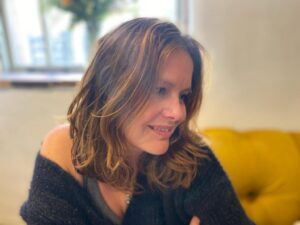Thank you to Debra for sharing these wonderful insights, including the pearl ‘When I’ve penned something I’m proud of I feel like I’m living truthfully.’
How do you believe a writer improves?
I find that if I don’t read, I write less. Reading jogs my memory, and reminds me that I’m creative and that I can write. I didn’t realise what a spur it was until I had writer’s block and stopped reading, almost out of guilt. But when I picked up a book, and considered the words I was reading, I started to remember – and want to tell – my stories. Reading also lets me get into the flow of writing – flow is like a language in itself, isn’t it, and someone else’s encourages mine.
And writing longhand helps. If I don’t write longhand, I tend to have poorer recall. Even though typing is a tidier process, I feel more connected to words when I write them out by hand. I miss a few because of my appalling handwriting but what I lose in illegibility I make up for in emotional engagement.
Also (and this is taught in many writing classes) the more you write, the more you want to and the more you’re able to, so do it even if you don’t feel a spark of inspiration. Exercise that ‘muscle’, make it a habit. It doesn’t have to be reams; it can be a page.
Do you enjoy writing?
Would it be terrible to say that I don’t always? I’ve always been more of a dripping tap than a rolling stream! I often find writing laborious, painful and frustrating, yet I love it more than any other activity – when I’ve penned something I’m proud of I feel like I’m living truthfully.
What are the most important steps an amateur writer can take?
Read, write, join a writing class or group, watch online masterclasses, go to author talks. Some writers are lone wolves – well, we all are when we’re writing, I suppose – but it does help to be around others; understanding their processes, getting feedback, even learning not what to do. I did an MA in Creative and Life Writing and while that’s not an option for many, or something they’d want to do, it honed my skills and, essentially, gave me deadlines to work towards. I’m still part of a writing group from that course and have built up a trust and sisterhood. To refresh my knowledge, I do a few online classes or short courses a year, and I go to talks – these give me a kick up the behind, as well as providing inspiration and deadlines to work to. And lots are conducted online now, which makes them easier to access.
What have been your most meaningful or profound experiences as a writer?
I assumed I’d have a greater understanding of myself, or at least of my previous experiences, when I wrote, which is ostensibly why I did an MA that focused on life writing. But, the more I wrote about my internal world, the more I understood the external one. Writing has given me greater insight, and it’s made me feel more connected and compassionate towards others. As you write more, you watch more, and you’re always trying to comprehend, and I think that’s been a wonderful outcome of something I originally started to address a few skeletons in the closet.
Who would you say are your literary forebears? Who have you learned the most from?
I grew up on a diet of Jane Austen and The Brontë Sisters (coming from Yorkshire, I felt a particular affinity to the Brontës). In 1980s Britain, they were the female writers available to us. Then I discovered Sylvia Plath in my mid-teens and became obsessed, even taking a pilgrimage to her grave in Heptonstall (via Haworth). But while my interests range far and wide, I’m currently drawn to the writings of Jenny Offill, Maggie Nelson, Patricia Lockwood, Maggie Farrell and Claire Keegan, and I love the pared-down style of Japanese female writers such as Sayaka Murata and Emi Yagi. I don’t mean to mention only female writers but, in this instance, it’s because – as a working-class girl from Northern England – it was women’s voices that gave me the confidence to raise my own.
Which mistakes have you learned the most from?
That blaming others, or life, for not writing is self-deceptive and futile. Yes, life gets in the way – work, family, children, moving house, lockdown, ill health – these commitments or circumstances have all prevented me from writing. But they are also my reasons for writing, they are what feeds it. I have to regularly stop blaming life for impeding my progress – the only thing that gets in my way is me. Maggie Farrell was quoted as saying, ‘You just need to read and write, and keep going.’ That’s the pep talk I give myself when I’m finding excuses for not getting my head down.
I live in Brighton, UK, and work as a features writer for magazines and websites. I’m a graduate of Goldsmiths College’s Creative & Life Writing MA. I write short stories, autofiction and flash fiction – in 2020, I won The Bridport Short Story Prize. I’ve also been shortlisted for the Bath Short Story Award, the Bridport Flash Fiction Prize, the Oxford Flash Fiction Prize, and the Pat Kavanagh Award. I was a finalist for the London Independent Story Prize (flash category) and highly commended for the Writers and Artists Working Class Writers Prize. My longlists include the Manchester Fiction Prize and the London Library Emerging Writers Programme. I’ve been published in Litro, the Bridport Prize Anthology 2020, the Bath Flash Fiction V.5 and the Oxford Flash Transformations anthologies, and thiwurd’s Earthly Rewards.

